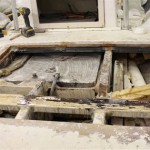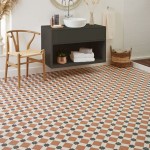Cost of Concrete Flooring Per Square Foot: A Comprehensive Guide
Concrete flooring has gained significant popularity as a durable, versatile, and aesthetically pleasing option for both residential and commercial spaces. The cost of concrete flooring per square foot is a crucial factor for anyone considering this flooring solution. Understanding the various elements that contribute to the overall price is essential for accurate budgeting and informed decision-making. This article provides a comprehensive overview of the factors influencing the cost of concrete flooring, breaking down the expenses associated with materials, labor, preparation, and finishing options.
The initial cost of concrete flooring can vary widely, depending on several key parameters. These include the existing condition of the subfloor, the desired aesthetic finish, the complexity of the installation process, and regional variations in labor and material costs. While concrete itself is a relatively inexpensive material, specialized finishes, intricate designs, and extensive preparation work can significantly increase the total cost per square foot.
Generally, the cost of concrete flooring can range from \$2 to \$30 or more per square foot. This broad range underscores the importance of obtaining detailed quotes from experienced contractors, specifying the desired finish and understanding the scope of work involved. A basic, utilitarian concrete floor will typically fall at the lower end of the price spectrum, while decorative, intricately designed floors will command a higher price.
Key Factors Influencing the Cost of Concrete Flooring
Several factors contribute to the overall cost of concrete flooring. These can be broadly categorized into material costs, labor costs, preparation costs, and finishing costs. Understanding the impact of each of these factors is crucial for accurately estimating the total expense associated with installing concrete flooring.
Material Costs: The raw cost of concrete is a primary component, but the type of concrete mix used can also influence the price. Specialized mixes, such as self-leveling concrete or concrete with added aggregates for decorative purposes, will typically be more expensive than standard concrete. The volume of concrete required, determined by the floor's square footage and desired thickness, also directly impacts the overall material cost. Any additional materials, such as vapor barriers, reinforcing mesh, or crack suppression membranes, will further contribute to the overall material expense.
Labor Costs: Labor costs represent a significant portion of the total expense, especially for complex installations or decorative finishes. Experienced concrete contractors charge higher rates due to their expertise and ability to ensure a high-quality, durable finish. The size and complexity of the project also influence labor costs. Larger projects may benefit from economies of scale, while intricate designs or difficult access to the work area can increase labor hours and, consequently, the overall cost. The contractor's reputation, experience, and insurance coverage also factor into their hourly or per-square-foot rates.
Preparation Costs: Proper preparation of the subfloor is essential for a successful concrete flooring installation. This may involve removing existing flooring, patching cracks or imperfections, leveling the surface, and ensuring adequate drainage. The extent of preparation required depends on the condition of the existing subfloor. If extensive repairs or leveling are necessary, the preparation costs can be substantial. In some cases, significant structural work may be required before concrete can be poured, further increasing the overall cost. The cost of disposing of any removed materials also falls under preparation expenses.
Finishing Costs: The finishing process significantly impacts the aesthetic appeal and durability of concrete flooring. Various finishing options are available, each with its associated cost. These include polishing, staining, sealing, epoxy coatings, and decorative overlays. Polishing involves grinding the concrete surface to achieve a smooth, glossy finish, which can be a relatively expensive process depending on the level of polish desired. Staining adds color and depth to the concrete, while sealing protects the surface from stains and moisture. Epoxy coatings provide a durable, seamless finish that is resistant to chemicals and abrasion. Decorative overlays, such as micro-toppings or stamped concrete, can create unique textures and patterns, but they are typically more expensive than other finishing options.
Breaking Down the Cost per Square Foot: Specific Examples
To illustrate the cost variations, consider a few specific examples of different concrete flooring finishes: a basic concrete slab, polished concrete, stained and sealed concrete, and epoxy-coated concrete.
Basic Concrete Slab: A basic concrete slab is the simplest and most economical option. The cost typically ranges from \$2 to \$6 per square foot, including the concrete material, pouring, and basic finishing. This option is often used in garages, basements, or industrial settings where aesthetics are not the primary concern. The finishing typically involves smoothing the surface and applying a basic sealer.
Polished Concrete: Polished concrete offers a modern and sophisticated look, with a smooth, glossy finish. The cost typically ranges from \$6 to \$15 per square foot, depending on the level of polish and the complexity of the preparation work. Polishing involves grinding the concrete surface with progressively finer grits of diamond abrasive tools, followed by densifying and sealing. The higher the level of polish, the more labor-intensive and expensive the process becomes.
Stained and Sealed Concrete: Stained and sealed concrete provides a cost-effective way to add color and visual interest to the floor. The cost typically ranges from \$4 to \$12 per square foot, including the staining process, sealing, and any necessary surface preparation. The cost of the stain itself varies depending on the type and desired color. Sealing is essential to protect the stained concrete from damage and wear. Multiple coats of sealer may be required for optimal protection.
Epoxy-Coated Concrete: Epoxy-coated concrete offers a durable, seamless, and chemical-resistant finish, making it suitable for garages, workshops, and industrial environments. The cost typically ranges from \$5 to \$20 per square foot, depending on the type of epoxy, the number of coats applied, and the complexity of the installation. Epoxy coatings can be clear or pigmented and can be combined with decorative flakes or metallic pigments for added visual appeal. Proper surface preparation is crucial for a successful epoxy coating, as the coating will only adhere properly to a clean, dry, and properly prepared surface.
Additional Cost Considerations
Beyond the core factors of materials, labor, preparation, and finishing, several other considerations can influence the overall cost of concrete flooring. These include the size and accessibility of the project area, the location of the project, and any unexpected issues that may arise during the installation process.
Project Size and Accessibility: Larger projects may benefit from economies of scale, as contractors may be able to offer lower per-square-foot rates for larger areas. However, larger projects also require more materials and labor, so the total cost will still be higher. Accessibility to the project area can also impact the cost. If it is difficult to access the area with equipment and materials, the contractor may need to charge more to cover the additional labor and time required.
Project Location: Labor and material costs can vary significantly depending on the geographic location. Urban areas typically have higher labor costs than rural areas, and the cost of materials may also be higher due to transportation and supply chain factors. It is essential to obtain quotes from local contractors to get an accurate estimate of the cost of concrete flooring in a specific area.
Unexpected Issues: During the preparation or installation process, unexpected issues may arise that can increase the cost of the project. These issues may include hidden damage to the subfloor, unforeseen structural problems, or the need for additional repairs. It is advisable to set aside a contingency fund to cover any unexpected expenses that may arise during the project.
Long-Term Costs: While the initial cost of concrete flooring can be higher than some other flooring options, it is essential to consider the long-term costs as well. Concrete flooring is highly durable and requires minimal maintenance, which can result in significant cost savings over time. Unlike carpets or hardwood floors, concrete flooring does not need to be replaced regularly and is resistant to stains, scratches, and moisture. This makes it a cost-effective flooring option in the long run.
Concrete flooring offers a versatile and durable flooring solution with a range of aesthetic possibilities. Understanding the factors that influence the cost per square foot is crucial for budgeting and planning a concrete flooring project effectively. By carefully considering the material costs, labor costs, preparation costs, finishing options, and other relevant factors, homeowners and business owners can make informed decisions and achieve the desired look and performance for their concrete floors.

Cost Of Concrete Floor Coating Fixr

Cost Of Concrete Floor Coating Fixr

Polished Concrete Floor Cost How Much To Grind Network

How Much Does It Cost To Stain Concrete Floors Yourself

How Much Is Polished Concrete

Polished Concrete Floor Cost Polishing

Concrete Overlay Cost How Much Per Square Foot Network

How Much Do Polished Concrete Floors Cost Blackrock Industrial

Cost To Stain Concrete How Much Floors Network

How Much Is Polished Concrete
Related Posts








